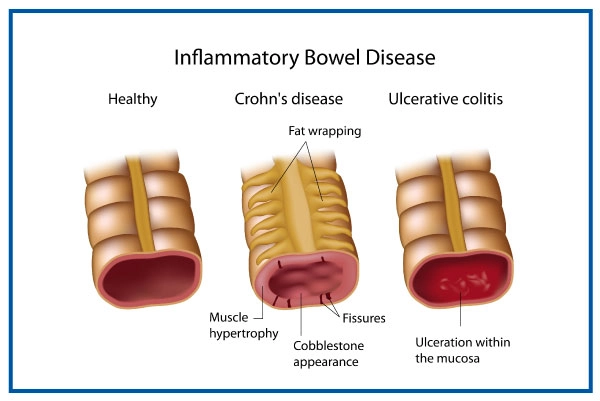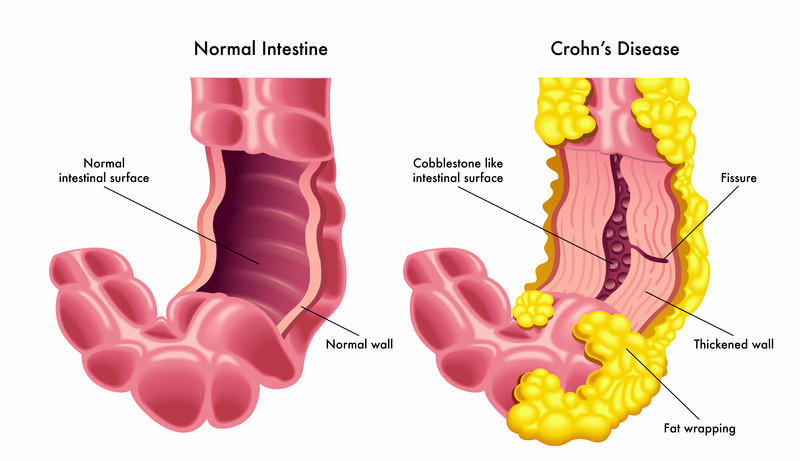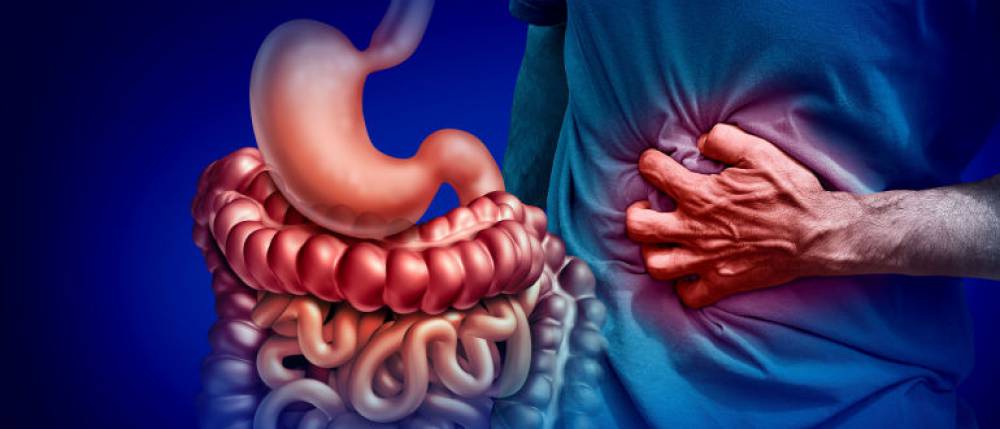Crohn’s Disease Self-Care Person’s standard of living can be significantly impacted by Crohn’s disease, a kind of intestinal inflammation (IBD). People who have been diagnosed with Crohn’s disease frequently struggle to control their symptoms and go about their everyday lives. On the other hand, effective self-care techniques can enhance general well-being and lessen the frequency of flare-ups.

Understanding Crohn’s Disease Self-Care
Crohn’s disease is a long-term chronic illness primarily impacting the digestive system. It may result in tiredness, diarrhea, weight loss, and stomach pain. Although the exact cause of Crohn’s disease is still unknown, a mix of immunity, environmental, and personal factors are believed to be involved.
What are the Symptoms and Diagnosis of Crohn’s Disease Self-Care
Crohn’s disease signs might differ greatly from person to person, however, they often include:
- Cramps and discomfort in the abdomen
- Certain bloody stool
- Weakness and exhaustion
- Hunger decline
- High temperature
- Loss of weight
A combination of medical history review, physical examinations, blood tests, imaging investigations (which may include CT or MRI scans), and endoscopic surgical operations (such as colonoscopies) is usually used in the diagnosis process.
Importance of Crohn’s Disease Self-Care
Active self-care is essential for people with Crohn’s disease to properly manage symptoms and avoid complications. By taking care of themselves, people may improve their standard of life while also taking charge of their well-being.

What is the Impact of Crohn’s Disease on Daily Life
Crohn’s disease can cause fluctuations in symptoms and possible consequences that might interfere with everyday living, employment, and social connections. This emphasizes how crucial it is to look at self-care from a comprehensive perspective.
Role of Self-Care in Managing Symptoms
Crohn’s Disease Self-Care Several lifestyle changes and routines that can both positively impact the disease’s progress and reduce the intensity of symptoms are included in self-care.
Diet and Nutrition
An adequate diet is essential for controlling Crohn’s disease symptoms. Dietary guidelines may differ, but in general, it is advised to stay out of triggering foods like those that are oily, smoky, or heavy in fiber.
Importance of a Balanced Diet
In addition to promoting general health, a balanced diet assists in reducing gastrointestinal discomfort. Make an effort to eat a diet high in nutrients, such as cooked vegetables, lean meats, and easily broken-down carbs.
Some of the foods that you can use in your balanced diet:
Foods to Avoid and Include
Steer clear of things like dairy, coffee, alcohol, or high-fiber meals that might make your symptoms worse. Rather, include meals high in probiotics, sunlight, vitamin D, and omega-3 fatty acids (like fish).
Hydration and Fluid Intake
For Crohn’s disease sufferers, staying well hydrated is crucial, particularly during flare-ups. Keep your fluid intake constant by choosing electrolyte-rich drinks, herbal teas, and water.
Top Fluid Options for People with Crohn’s Disease
To remain hydrated without making symptoms greater, stay transparent of sugary beverages & choose coconut water, mild fruit juices, and clear broths.
What is Medication Adherence
Adhering to specified drug schedules is essential for the successful management of Crohn’s disease. Drugs can help manage symptoms, reduce inflammation, and avoid problems.
The Value of Adhering to Treatment Plans
Adhering to recommended drug regimens consistently can help limit disease activity and lower the likelihood of flare-ups.
How Can You Manage Your Stress
Anxiety can make Crohn’s disease symptoms worse. One effective way to control stress levels is to engage in techniques for reducing stress like yoga, meditation, or deep breathing.
Methods for Reducing Stress
To reduce stress and improve general well-being, emphasize relaxation, take up hobbies, and enjoy time outside.
Frequent Workout
For those with Crohn’s disease, exercise has several advantages, such as better digestion, less inflammation, and a happier disposition.
Exercise’s Benefits for People with Crohn’s Disease
If you want to encourage regular exercise without increasing your symptoms, go for activities with little impact like yoga, swimming, or walking.

Hygiene of Sleep Helpful in Crohn’s Disease Self-Care
Healthy sleep is critical to general health and recovery. Create a pleasant sleeping atmosphere and develop a calming nighttime habit.
Advice for Increasing the Value of Sleep
To encourage sound sleep, minimize screen time, stick to a routine sleeping schedule, and stay away from drugs close to bedtime.
Keeping an eye on symptoms will help in Crohn’s Disease Self-Care
Acquire the skill of identifying the initial indicators of relapses and promptly seek medical assistance if needed.
Recognizing Flare-Ups
Increased discomfort, diarrhea, exhaustion, or temperature may all be signs of a flare-up. To maintain track of trends and causes, keep a symptom diary.
How Network of Support Will Help You in Crohn’s Disease Self-Care
Having a solid support system of friends, family, or support groups may help during difficult times by providing emotional as well as practical assistance.
Family and close friends
Inform close ones about Crohn’s illness to promote empathy and understanding.
Comprehensive Methods
Medical procedures can be improved by alternative methods such as aromatherapy, medicinal products, or physiotherapy.
Yoga and Awareness
Reducing circulation and encouraging composition are two benefits of mindfulness and meditation practices.
Conclusion
In summary, self-care is essential to controlling Crohn’s disease and enhancing the lives of those who are impacted. Patients can effectively control symptoms and lead satisfying lives by implementing a holistic strategy that encompasses nutrition, hydration, medication adherence, stress management, exercise, and assistance networks.
Frequently Asked Questions
Can diet cure Crohn’s disease?
There is no recognized treatment for Crohn’s disease, yet food can assist control its symptoms.
Is stress a trigger for Crohn’s flare-ups?
Indeed, stress can make the signs of Crohn’s disease worse and cause flare-ups.
Can exercise worsen Crohn’s symptoms?
In general, Crohn’s disease sufferers benefit from gentle, low-impact exercise; nevertheless, it’s crucial to pay attention to your body and refrain from intense activities when your condition flares up.
